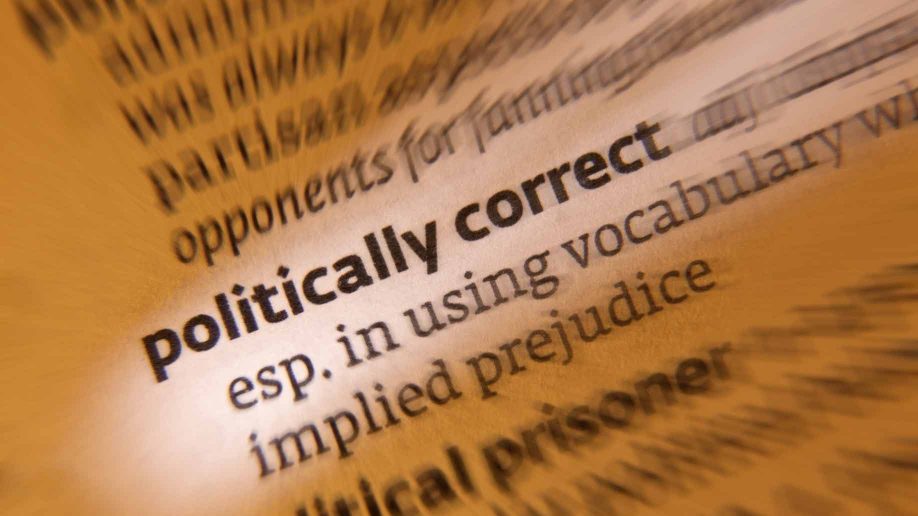
“Sticks and stones may break my bones, but words will never hurt me.” This old English rhyme is often heard during one’s childhood, typically as comfort to a victim of ridicule by other children. Implicit in the advice is the unspoken admonition to the child to grow up and ignore the pain of verbal abuse – after all, it’s only words.
Many believe that the avoidance of words that may offend, marginalize, or insult a group of people – political correctness (PC) – has gone too far. According to PC critics, PC promotes a society of victimhood and endangers the public at large by limiting discussion about controversial subjects. Chris Cox, the executive director of the NRA Institute for Legislative Action, wrote in a USA Today op-ed about the Orlando mass shootings that the “administration’s political correctness prevented anything from being done about it.”
Conservatives claim that PC is a threat to the first amendment and our right to free speech. Columnists liken modern-day America to Ray Bradbury’s “Fahrenheit 451” or George Orwell’s future society in “1984“. In “1984”, Big Brother’s thought police relentlessly pursue anyone foolish enough to say anything that might be offensive to someone. Surprisingly, liberals – often blamed for the expansion of PC – have their own misgivings about verbal censorship. Ralph Nader, a former third-party candidate for president, says, “You can’t say this about that, and you can’t say that about this. And the employer tells you to hush. And perhaps your wife tells you to hush, and your kids tell you to hush. It’s gotten absurd.”
Does one’s choice of words matter? Have efforts to avoid offense stifled free speech as many claim? Is political correctness an expression of politeness, evasion of hard truths, or extreme sensitivity? Or is an expression of anti-PC sentiment simply incivility, indecency, or vulgarity, as Mark Hanna writes in TIME?
Read more . . .
Should you Purchase Health Insurance or Pay the Penalty?
This article first appeared in TheBlaze.com on September 17, 2013
 Obamacare is right around the corner, with most of the Affordable Care Act (ACA) policy changes taking place in early 2014. But one recent change to the ACA could drastically affect many individuals who thought their employer would provide the requisite coverage.
Obamacare is right around the corner, with most of the Affordable Care Act (ACA) policy changes taking place in early 2014. But one recent change to the ACA could drastically affect many individuals who thought their employer would provide the requisite coverage.
A major component of the ACA is the requirement of organizations with 50 or more employees to provide health insurance benefits to their full-time staff. However, this component was postponed until January 1, 2015. That means that the employees of companies who fall into this category may not immediately receive health benefits through their employer or coverage that is sufficient to meet the criteria, and will be required to either purchase individual health insurance by March 31, 2014 or pay a fine that will be collected when filing 2014 income taxes.
This delay will end up directing more people into the new federal and state insurance exchanges, or “Health Insurance Marketplaces.” Plans are available in four tiers of premiums and deductibles designated as “Bronze”, “Silver”, “Gold”, and “Platinum”. Purchasers can compare plans and pick insurance policies that best fit their needs.
The question many people are asking themselves is, “Should I buy health insurance or pay the fee?”
Should You Purchase Health Insurance or Pay the Penalty?
 Obamacare is right around the corner, with most of the Affordable Care Act policy changes taking place in early 2014. But one recent change to the ACA could drastically affect many individuals who thought their employer would provide the requisite coverage.
Obamacare is right around the corner, with most of the Affordable Care Act policy changes taking place in early 2014. But one recent change to the ACA could drastically affect many individuals who thought their employer would provide the requisite coverage.
A major component of the ACA is the requirement of organizations with 50 or more employees to provide health insurance benefits to their full-time staff. However, this component was postponed until January 1, 2015. That means that the employees of companies who fall into this category may not immediately receive health benefits through their employer or coverage that is sufficient to meet the criteria, and will be required to either purchase individual health insurance by March 31, 2014 or pay a fine that will be collected when filing 2014 income taxes.
8 Tips to Protect Yourself from Rising Healthcare Costs
 The impact of the Patient Protection and Affordable Care Act, informally referred to as “Obamacare,” is likely to be felt by Americans in the near future through higher healthcare insurance premiums, increased difficulty in making doctor appointments, and decreased face-to-face consultations with their personal physicians. While the exorbitant annual increases in healthcare costs of past years could moderate – and possibly reverse – in the long-term as a result of the act, everyone should be prepared for higher healthcare expenses in the short-term.
The impact of the Patient Protection and Affordable Care Act, informally referred to as “Obamacare,” is likely to be felt by Americans in the near future through higher healthcare insurance premiums, increased difficulty in making doctor appointments, and decreased face-to-face consultations with their personal physicians. While the exorbitant annual increases in healthcare costs of past years could moderate – and possibly reverse – in the long-term as a result of the act, everyone should be prepared for higher healthcare expenses in the short-term.
Each American will be required to assume more financial responsibility for his or her health. Fortunately, there are steps you can take to moderate the higher costs while improving the health of yourself and your family. Most steps merely involve simple changes in lifestyle and everyday habits.

